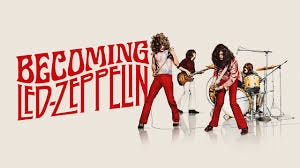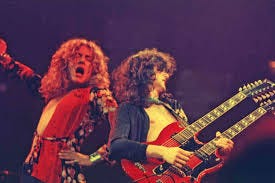When it comes to music, we don’t really understand how it works. Which, perhaps, is a good thing, a mystical thing. We hear a sound or a succession of sounds in a song, and generally speaking, we respond to it. Like when a Dr. Dre “song” came on the car radio when we were driving to a baseball game over the weekend, I responded to it, all right. I shut the radio off.
There are other sounds that, the very first time you hear them, there’s an instant appeal, an unmistakable connection that you can’t necessarily explain, justify or analyze. It’s just there, immediately. At least, that’s how it was with me and Led Zeppelin. And evidently, I wasn’t alone.
One of rock’s all-time great record-selling bands, Led Zeppelin is at the head of the class. Yet when it comes to precisely trying to explain their appeal to the uninitiated, it’s like back in the day when I would ask my students why they liked a particular hip hop song. And after stumbling around for the words they couldn’t — and weren’t — going to find, they’d finally mutter something like “I like the beat.” Whereupon I would start rhythmically banging on a desk, asking, “You mean like this?” And they’d laugh. No, it wasn’t the beat. It was something else.
As well-done as “Becoming Led Zeppelin,” the new music documentary on Netflix, is — and it’s one of the best music docs I’ve ever seen — it doesn’t really explain what it is about their music that made it irresistible for so many of us. Which is interesting to me. Having listened to their music off and on for 50 years or more and I have all their original albums, I’d like to know why.


More than one acquaintance has termed me a “musical snob,” an appellation of which I remain proud. Grateful Dead? No. David Bowie? “Station To Station” yes, the Ziggy Stardust nonsense, No. Rush? No. Yes? No!
As an author of sorts and a rather picky writer for 50 years — Isaac Asimov? Robert Heinlein? No! Stephen King? No. John Grisham? No. James Patterson? OMG NO! —the very idea that lyrics like these are appealing to me is, frankly, surprising.
“You need coolin'. Baby, I'm not foolin'. I'm gonna send ya Back to schoolin'
Way down inside. Honey, you need it. I'm gonna give you my love. I'm gonna give you my love
Oh, wanna whole lotta love. Wanna whole lotta love. Wanna whole lotta love.”
Wanna whole lotta love.”
I will confess to not being expert in this area but it seems to me that Robert Plant, Led Zeppelin’s rather expressive and excitable singer, isn’t really talking about love, per se, though that phrase may come up, so to speak, as a prelude to what he IS singing so intensely about.
Yet, combined with the around-the-bend, ear-crunchingly rude sounds Jimmy Page wrenches out of his guitar, John Bonham’s relentlessly “the natives are restless” pounding drums and John Paul Jones’ supportive and musically adept bass, you can see why the radio stations would not stop playing “Whole Lotta Love” and why now, hearing it after all these years, considering all the other songs who’ve flowed through these well-worn ears of mine, “Love” still sounds exploratory, fresh and raw and powerful. Let’s hear it again.
And it wasn’t just me. When they convened guitarists Jack White, David “The Edge” Evans of U2 with master Page for the commendable music doc “It Might Get Loud” that was the one riff these aces wanted Page, the master, to demonstrate.
“Becoming Led Zeppelin” does a marvelous job of tracing the backstory of how these four got together; how Page’s obsession with skiffle and Lonnie Donegan led to him becoming a skilled, diversely talented guitarist and studio session player, even playing on “Goldfinger”! And we learn how John Paul Jones’ parents were in vaudeville, how he served time as a church organist and was obsessed with the sound from the bass from his youth. And how Robert Plant rambled and scrambled from band to band (and no doubt thigh-to-thigh) and later connected with thunderous drummer John Bonham, much to his wife’s dismay and somehow, when the four of them got together, there was, well, there’s no other word for it other than magic.
The video clip of their fledgling show in Denmark is simply stunning! If you were a talent scout, this would be a band you would absolutely have to sign, even if you couldn’t define their sound or their appeal. They had IT.
And it’s definitely clear — and this may be why Page and company took such care with this doc — that Page had an aural vision for the band from the start. He not only understood how to make records thanks to his unusually diverse experience as a session guitarist, he was able to shape a dramatic, dynamic, distinctive sound that simply filled the air in a way no other band quite did. There was nobody quite like them.
The Who, for example, were similarly powerful but wrote songs that were more literary. Pete Townshend’s “Tommy” and “Quadrophrenia” were wildly ambitious, extended works where he used the band more or less as musical soldiers to help get his introspective themes and concepts across in a powerful way.
Zeppelin had no literary pretense about their work. As evidenced by their biggest hit, Led Zeppelin wasn’t aiming for your head or heart but perhaps a bit lower; a level where you might feel rather than nod in agreement, emotionally identifying with the struggles of Townshend’s tautly drawn teenagers.
Page knew how to make records that were dark and light, highly charged and daring, perhaps borrowing a line or two or an idea from an old blues or folk number but almost always, in the end, making the track sonically, undeniably their own.
Their sound was as big as you could get, that’s where Page’s ambitious lay and on their finest records, they connected with their audiences in a visceral, explosive way that carried a power that must have surprised even Page himself. And those songs still hold up. They were built to last.
A while back, I had a chance to see a cover band in Connecticut called “The British Legends Of Rock,” a well-traveled group of 50-60-year-olds who had grown gray as well as up with that sort of music and we saw them perform a nicely diverse set of material from the British Isles from those glory days, from the Hollies, to the Kinks, to the Dave Clark Five and so on. Of the whole set, the songs that absolutely just jumped off that small stage at Old Saybrook’s “The Kate,” were all by Led Zeppelin.
The guitarist was no Jimmy Page, the singer no Robert Plant — and that’s not a slam, there was only one of each — but the music that Led Zeppelin had built — sounded just about as fresh and dynamic and rousing that night as what you might have heard pouring out of your car’s FM radio in 1969.
I realized in mid-tune, as often as I’d listened to Zep’s music over the years, it was actually the first time I’d ever heard a Led Zeppelin song performed live in the very same room where I was.
It made me wonder what it must have been like for the innocent folks sitting in the Teen Club in Gladsaxe, Denmark in 1968 that we see in the video, hearing this brand new group for the first time, a group not called Led Zeppelin just yet (Keith Moon gave them that name!) just rip-snorting their way through a definitive “How Many More Times.” It’s a version so compelling, relentless, exciting, raucous and untamed that it was clear there was not going to be any stopping this group.
They were, as advertised “Becoming Led Zeppelin.”


Well done John. I wouldn't have watched the movie without your prompt. It was excellent as you noted! Thanks.
I played Led Zeppelin so much in my youth that I couldn't listen to it for decades. I haven't watched the movie yet, but I will soon. I used to have a massive crush on Jimmy Page.